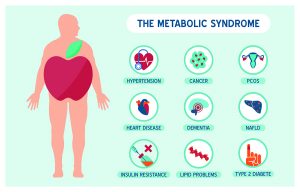A South Korean study showed that vitamins can reduce the risk of metabolic syndrome. Metabolic syndrome is a change in metabolism in patients with excess abdominal fat. They also often have high blood sugar, high blood pressure and high LDL cholesterol. In addition their liver often develops non-alcoholic fatty liver disease (NAFLD), which has the potential to make the patient really sick.
Study from South Korea
- The study included 1847 vitamin supplement users and 4461 non-supplement users. They were part of the 2010-2011 Korea National Health and Nutrition Examination Survey. Based on 24-hour recall researchers analyzed the data for antioxidant content of the diet.
- First of all, the study showed that there were 18% less metabolic syndrome cases in those who took vitamin supplementations. Furthermore, those who took the highest amount of vitamin A supplements showed different results than persons who took the least amount or none. There was a 28% lesser amount of metabolic syndrome in the highest users of vitamin A.
- Another finding was that the highest group of vitamin E supplement users had 26% less metabolic syndrome than the lowest vitamin E group.
- Finally, with the measuring of the antioxidant capacity from both diet and antioxidant supplements researchers noticed similar findings. The highest third of antioxidants had a risk of metabolic syndrome that was 28% lower than the lowest third.
Interpretation of the study
Metabolic syndrome is a cluster of conditions as mentioned above that occur together. Hence there is an increased risk of heart attacks, strokes and diabetes. In addition, researchers have shown that patients with metabolic syndrome have inflammation in their blood. Test for this are laboratory tests for the C-reactive protein (CRP). Part of the inflammatory reactions taking place is the release of free radicals. Antioxidant vitamins like vitamin A or E neutralize these free radicals. This could be the explanation of the findings of this study. If the antioxidant vitamins block the inflammatory reaction in metabolic syndrome, this reduces the percentage of metabolic syndrome among patients. Other studies showed this in the past.
Conclusion
A South Korean study of both, vitamin A and vitamin E, showed that these vitamins have antioxidant activities. They reduced the percentage of lowering metabolic syndrome in the highest third of supplement takers by 26% to 28%. The study also found that it was the antioxidant activity of these supplements that was responsible for this effect. Metabolic syndrome is an inflammatory condition associated with high values of the C-reactive protein blood test. Free radicals are part of the inflammatory process, and vitamin A, E and other antioxidants neutralize these free radicals, which contributes to prevention of diseases..







